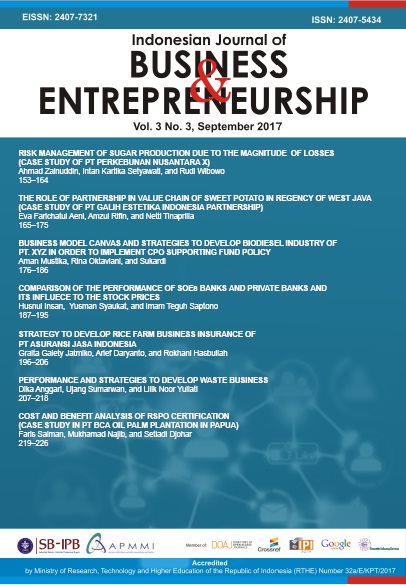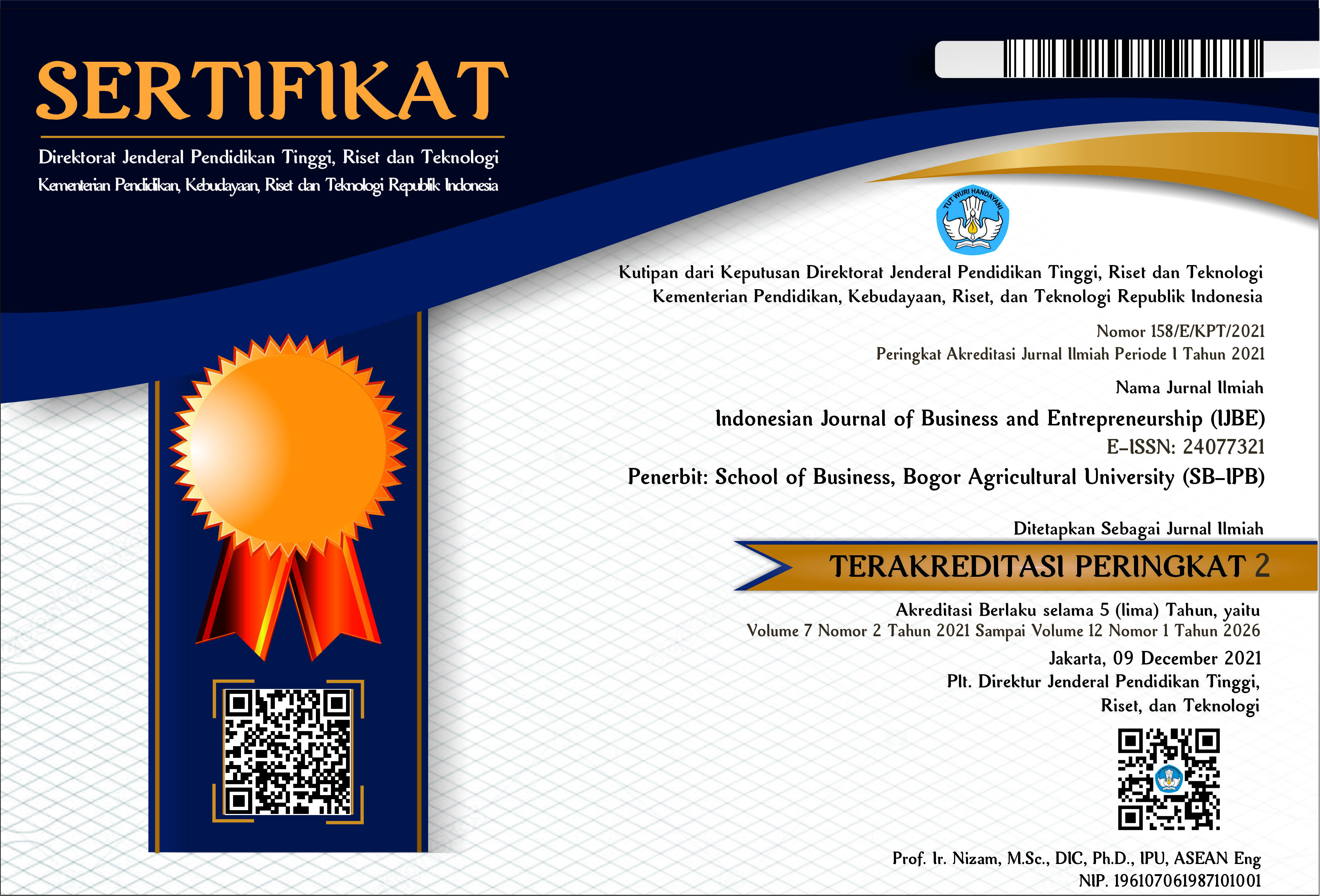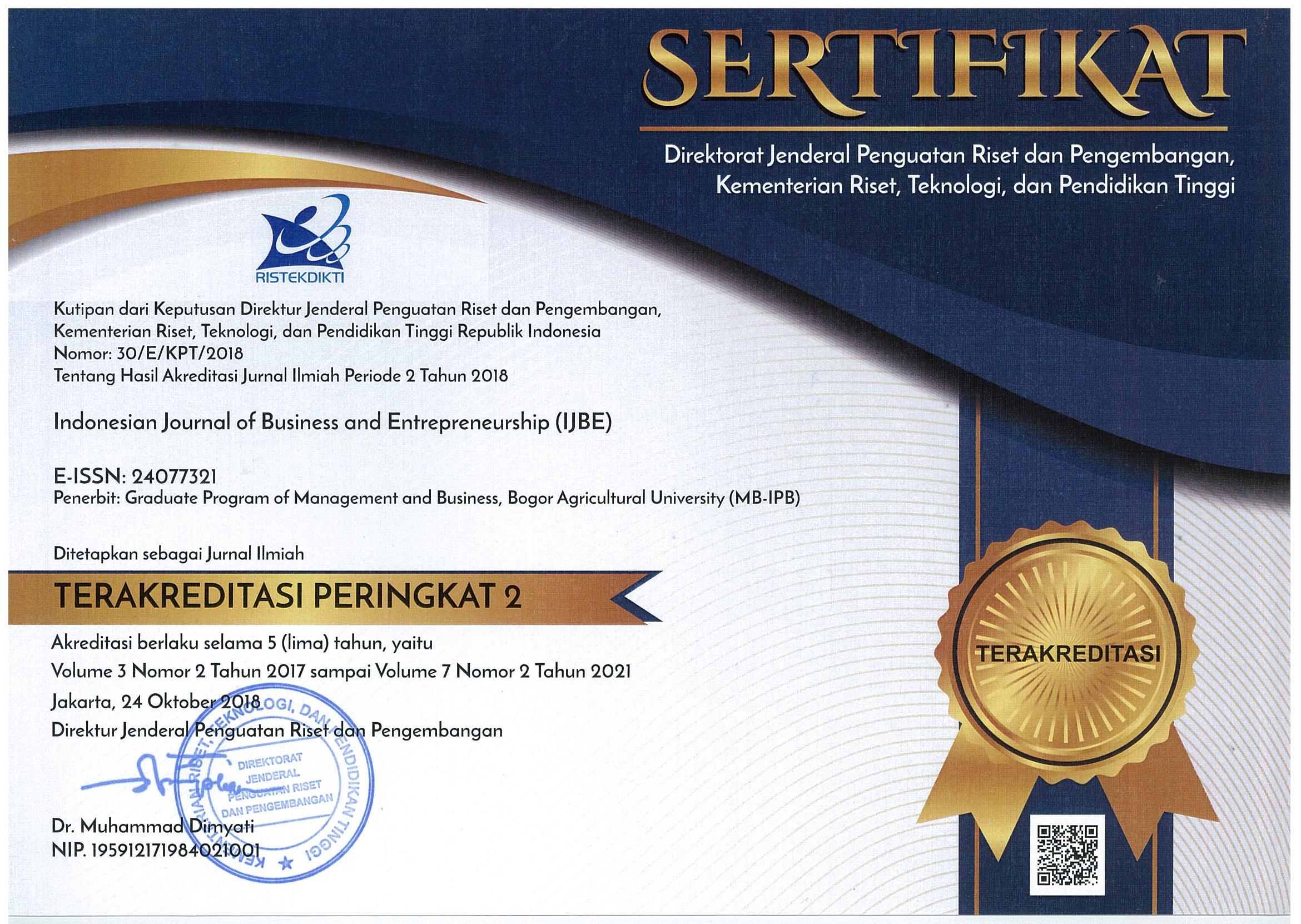Performance and Strategies to Develop Waste Business
Abstract
The objectives of this study are to measure the performance conducted based on the generating of turnover and magnitude of volume of wastes deposited by the waste sellers to CV. MBG and to analyze alternative strategies on waste business, especially for CV. MBG, through four perspectives on the Balanced Scorecard method. In addition, this study also analyzed the priorities of the four perspectives using ANP. The results show that the turnover per day can reach 94 million rupiah, and the volume generated per day can reach 12 tons. Furthermore, there are four perspectives that can measure the performance and internal process perspective as a priority to be more noticed. The conclusion of the research result shows that waste business becomes one of the most promising businesses. The managerial implication of this study is that the four BSD perspectives sorted according to their priorities from the ANP can be applied to support the company performance.
Keywords: performance measurement, waste processing, analytical network process, Balanced Scorecard, CV MBG
Downloads
References
Aisyah. 2013. Pengelolaan sampah rumah tangga berbasis masyarakat di RT 50 Kelurahan Sungai Pinang dalam Kecamatan Samarinda Utara (Tinjauan Peraturan Daerah Kota Samarinda Nomor 02 Tahun 2011 Tentang Pengelolaan Sampah). Jurnal Beraja Niti 2(12): 1–8.
Handayani DS, Budisulistiorini SH, Nuraini MR. 2009. Kajian nilai ekonomi penerapan konsep daur ulang pada TPA Jatibarang Kota Semarang. Jurnal Presipitasi: Media Komunikasi dan Pengembangan Teknik Lingkungan, 6(2): 35–44. doi:http://dx.doi.org/10.14710/presipitasi.v6i2.35-44
Kaplan S, Norton DP. 1996. Balanced Scorecard Menerapkan Strategi Menjadi Aksi. Alih Bahasa R. Yosi Pasla, Judul Asli : The Balanced Scorecard: Translating Strategy into Action. Boston, MA: Harvard Business School Press.
Kurniawan N. 2009. Analisis kelayakan pengolahan sampah kota menjadi produk yang berguna di TPA Bantargebang. Depok: Universitas Gunadarma.
Laili FM, Rachmawati S, Ningrum AV. 2006. Pemberdayaan potensi ekonomi sampah kota surabaya penyuluhan pengelolaan sampah terintegrasi di Lingkungan Keputih Surabaya. Surabaya: Institut Teknologi Sepuluh Nopember.
Lindqvist K. 2013. Hybrid governance: the case of household solid waste management in Sweden. Public Organization Review 13(2):143–154. https://doi.org/10.1007/s11115-013-0229-8.
Misuzu A, Sakai Shin-ichi. 2011. Consumer Perspectives on Household Hazardous Waste Management in Japan. 3R International, Kyoto Workshop on 3R and Waste Management. Kyoto University Environment Preservation Center, Yoshida.
Scortar L, Lazar S, Suciu L. 2009. Household waste management around the globe in Managerial Challenges of the Contemporary Society. Proceedings; Cluj-Napoca : 249-256. Cluj-Napoca: Babes Bolyai University.
Munifah. 2007. Analisis pengukuran kinerja perusahaan menggunakan metode Balanced Scorecard (BSC) dan Analytical Hierarchy Process (AHP) di Pabrik Gula Gending Probolinggo. Jurnal Ilmiah Teknik dan Manajemen Produksi “TEKMAPRO” 2(2): 1–6.
Onong U, Effendy. 1989. Human relations dan Public Relations dalam Management; (Edisi Ketujuh). Bandung: Mandar Maju.
Parmenter D. 2010. Mengembangkan Mengimplementasikan dan Menggunakan. Alih Bahasa Hauriyan, Judul Asli : Key Performance Indicators – Developing, Implementing, and Using Winning KPIs;(Sec Ed). New Zealand, PPM.
Sidarto. 2010. Analisa usaha proses pengelolaan sampah rumah tangga dengan pendekatan cost and benefit ratio guna menunjang kebersihan lingkungan. Jurnal Teknologi 3(2):161–168.
Subekti S. 2009. Pengelolaan Sampah Rumah Tangga 3R Berbasis Masyarakat. Majalah Ilmiah Universitas Pandanaran 7(14): 1–6.
Suhendi. 2010. Perancangan sistem pengukuran kinerja MB – IPB dengan Metode Balance Scorecard [tesis]. Bogor: MB-IPB.
Vanany I. 2003. Aplikasi Analytic Network Process (ANP) pada perancangan sistem pengukuran kinerja (studi kasus pada PT.X). Jurnal Teknik Industri 5(1):50–62.
Williams B. 2009. The Management of Household Hazardous Waste in Harris County: Residents Attitudes and Perceptions. Texas Southern University.









